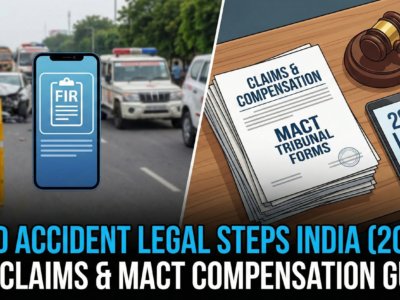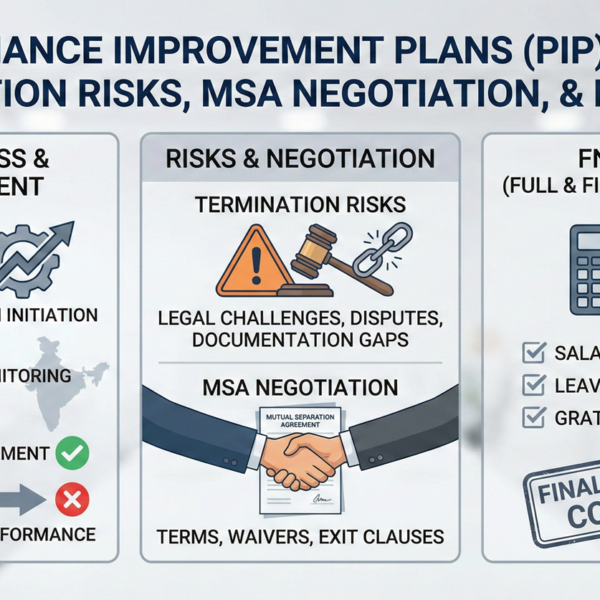The act of forging a spouse’s signature, while occurring within the private sphere of marriage, is governed by the stringent provisions of the Indian Penal Code (IPC), 1860. The law does not carve out an exception for marital relationships; instead, it applies the same principles of criminal culpability to a spouse as it would to a stranger. This guide explores the complete legal framework, including the critical differences between criminal and civil remedies, the specific IPC sections that apply, and the procedural roadmap for an aggrieved spouse seeking justice and the recovery of assets.
Legal Deep Dive
Forgery of a Spouse's Signature in India:
A Comprehensive Legal Guide
A detailed analysis of the criminal and civil ramifications when one spouse forges the other's signature on legal or financial documents.
The act of forging a spouse's signature, while occurring within the private sphere of marriage, is governed by the stringent provisions of the Indian Penal Code (IPC), 1860. The law does not carve out an exception for marital relationships; instead, it applies the same principles of criminal culpability to a spouse as it would to a stranger. This guide explores the legal framework, available remedies, procedural steps, and potential defenses related to spousal forgery in India.
The Legal Framework of Forgery
The foundation of forgery law in India rests within the Indian Penal Code. Understanding these core sections is crucial to grasping the severity of the offense.
Defining Forgery: Section 463 of the IPC
The cornerstone of forgery law, Section 463, focuses on the intent behind creating a false document.
"Whoever makes any false document or false electronic record or part of a document or electronic record, with intent to cause damage or injury, to the public or to any person, or to support any claim or title, or to cause any person to part with property, or to enter into any express or implied contract, or with intent to commit fraud or that fraud may be committed, commits forgery."
This definition requires two key ingredients: the physical act of making a "false document" and the criminal intent (mens rea) to cause harm, support a false claim, or commit fraud.
What is a "False Document"? Section 464 of the IPC
Section 464 elaborates on what it means to "make a false document." It can happen in three ways:
- Fraudulent Creation: Dishonestly making or signing a document to make it seem like it was authorized by someone else.
- Fraudulent Alteration: Dishonestly altering a material part of a genuine document without lawful authority.
- Fraudulent Procurement: Deceiving someone or exploiting their incapacity (e.g., intoxication) to get them to sign a document.
Key IPC Sections at a Glance
Filter the table below to quickly identify sections based on their procedural classification. This is critical for legal strategy.
| Section (IPC) | Offence in Brief | Punishment | Classification |
|---|---|---|---|
| 465 | Punishment for Forgery | Up to 2 years, or fine, or both | Non-Cognizable Bailable |
| 467 | Forgery of Valuable Security, Will, etc. | Life or up to 10 years, and fine | Cognizable Non-Bailable |
| 468 | Forgery for Purpose of Cheating | Up to 7 years, and fine | Cognizable Non-Bailable |
| 471 | Using a Forged Document as Genuine | Same as for the forgery | Depends on forgery |
| 406 | Criminal Breach of Trust | Up to 3 years, or fine, or both | Cognizable Non-Bailable |
Comparing Punishments & Charges
This section provides visual tools to understand the severity of forgery-related offenses and determine which charges might apply.
Decision Tree: Which Offense Applies?
This simplified tree helps determine potential charges based on the document type and intent. Start at the top and follow the path that matches the situation.
START: A signature was forged on a document.
What was the document's purpose?
Purpose: To CHEAT or cause wrongful gain/loss.
Was it a 'Valuable Security' (e.g., property deed, will)?
YES
Sec. 467 IPC
Life or up to 10 years + Fine
NO
Sec. 468 IPC
Up to 7 years + Fine
General Forgery (no specific cheating purpose proven).
Sec. 465 IPC
Up to 2 years or Fine, or both
Additionally, if the forged document was knowingly USED as genuine...
Sec. 471 IPC
Punishment is the same as for the original forgery (e.g., Sec 467, 468, or 465).
Criminal vs. Civil Remedies
An aggrieved spouse must pursue two parallel legal paths: criminal action to punish the offender and civil action to nullify the forged document and recover assets. Understanding the difference is key.
| Aspect | Criminal Remedy | Civil Remedy |
|---|---|---|
| Objective | To punish the offender for the crime. | To nullify the forged document and restore rights/property. |
| Legal Basis | Indian Penal Code, 1860; CrPC, 1973. | Specific Relief Act, 1963; Contract Act, 1872. |
| Standard of Proof | Beyond a reasonable doubt. | Preponderance of probabilities. |
| Primary Outcome | Conviction (imprisonment/fine). | Decree declaring document void, restoration of property. |
| Interim Relief | Arrest, remand to custody. | Temporary Injunction to prevent asset transfer. |
Infographic: The Burden of Proof
The standard of proof required is dramatically different in criminal and civil courts. This visual explains the concept.
Criminal Case
Beyond a Reasonable Doubt
The prosecution must prove guilt so thoroughly that there is no other logical explanation for the facts, leaving no "reasonable doubt" in a juror's mind.
Civil Case
Preponderance of Probabilities
The plaintiff must show that their claim is more likely to be true than not true (a tipping of the scales, even if only slightly).
Infographic: "Void" vs. "Voidable" Documents
This legal distinction is critical. It determines if a forged document is a complete nullity from the start or valid until challenged, which impacts the rights of innocent third-party buyers.
Void (Void Ab Initio)
A legal nullity from the very beginning.
When does it happen?
Fraud as to the **character** of the document. The signer is deceived about what they are signing (e.g., told it's a power of attorney but it's a sale deed).
Legal Effect:
The document is treated as if it never existed. It confers no rights, and an innocent third-party buyer is not protected.
Voidable
Legally valid until cancelled by the defrauded party.
When does it happen?
Fraud as to the **contents** of the document. The signer knows what kind of document it is but is deceived about its details (e.g., knows it's a gift deed but more properties are included secretly).
Legal Effect:
The document is valid until a court sets it aside. If property is sold to an innocent third-party before that, their title may be protected.
The Marital Context: A Judicial View
While the law is blind to relationships, its application by courts is not. The pre-existing marital relationship introduces unique dynamics that influence the interpretation of evidence and intent.
No 'Spousal Exception'
A foundational principle of Indian criminal law is that there is no "spousal exception" for forgery. The IPC applies with equal force whether the forgery is committed against a spouse or a stranger, signifying clear legislative intent to treat it as a standard criminal offense.
The Element of Trust
The inherent trust in a marriage is a double-edged sword. A forgery by a spouse is a profound betrayal of a fiduciary duty, which courts can view as an aggravating factor. However, this same trust can form the basis of a defense, where the accused might argue their actions were based on an "implied consent" to manage joint affairs.
Infographic: The Dual-Track Remedy Flowchart
An effective response requires parallel action. This flowchart outlines the essential steps for an aggrieved spouse on both the criminal and civil fronts.
Criminal Track: To Punish
File an FIR
Immediately lodge a First Information Report with the police. Draft it to clearly state the "intent to cheat" to invoke stricter, cognizable sections (like Sec 468).
Police Investigation
The police will investigate. Insist that the disputed document be sent for forensic analysis by a handwriting expert.
Criminal Trial
If evidence is found, a chargesheet is filed, leading to a criminal trial where the state prosecutes the accused spouse.
Civil Track: To Recover
File a Civil Suit
Simultaneously file a suit for declaration and cancellation of the forged document in a civil court.
Seek Immediate Injunction
Crucially, file for a temporary injunction to prevent the spouse or any third party from selling or transferring the asset.
Civil Trial & Decree
The court will hear the case. If successful, it will issue a decree declaring the document void, nullifying the transaction.
Landmark Case Law Analysis
Judicial precedents provide crucial guidance. Explore thematic analyses of key cases below.
Proving Forgery & Signature Comparison
The approach to proving a forged signature is a recurring theme. Courts emphasize the role of forensic experts but retain the power to compare signatures themselves.
- S.P.A. Baskaran vs N.Sureshkumar: Clarified that the initial burden to prove a document's execution lies with the plaintiff, not the defendant alleging forgery. It also highlighted the importance of a well-reasoned expert report.
- K. Maniamma v. S.V. Govindaraju: Served as a cautionary tale where a court's reliance on its own comparison over expert evidence was deemed flawed, stressing the risks of courts acting as their own experts.
Forged Gift Deeds & Property Transfers
Disputes over property are a fertile ground for forgery, with numerous cases involving fraudulent transfers within families.
- Ningawwa vs Byrappa: The seminal judgment on fraudulent gift deeds between spouses. It established the critical legal distinction between void and voidable transactions based on the nature of the fraud.
- Vijay Pal Sharma vs State: Provided a modern analysis of the legal test for forgery of a General Power of Attorney (GPA), reinforcing that a false claim of ownership is not the same as creating a false document.
Documents Affecting Marital Status
Courts show very little tolerance for forgeries that seek to manipulate the legal status of a marriage itself.
- Forged Marriage Certificates: A multitude of cases have dealt with allegations of forged marriage certificates being used to fraudulently claim spousal rights or inheritance. Courts rigorously scrutinize these foundational documents.
- Forged Divorce Papers: Cases have shown that forging a spouse's signature on divorce papers is considered a "fraud upon the court" and is met with severe penalties, as it subverts the judicial process.
Potential Defenses for the Accused
An accused spouse is not without defense. The primary arguments revolve around negating criminal intent or proving consent, though the evidentiary bar is high.
Absence of Mens Rea (Criminal Intent)
The accused may argue the act was not "dishonest" or "fraudulent" but done for family convenience, to meet an urgent deadline, or with a mistaken belief of authority. Proving the absence of intent to cause wrongful gain or loss is key.
Consent (Express or Implied)
This is the most common defense. The accused may claim explicit permission (express) or that a long-standing pattern of conduct created a tacit authority (implied). Courts are highly skeptical of implied consent for major transactions and require strong, unequivocal proof.
Subsequent Ratification
The argument that the victim later approved the transaction. In criminal law, this does not erase the crime. In civil law, if the victim accepts benefits from the transaction (e.g., sale proceeds), it may prevent them from having the document cancelled, as it implies affirmation.
Preventative Measures & Best Practices
While the law provides remedies, prevention is always preferable. Spouses should consider these practices to safeguard their financial and legal interests.
Financial Vigilance
Maintain awareness of all joint assets, liabilities, and bank accounts. Regularly review statements and credit reports.
No Blank Documents
Never sign blank documents, including cheques, forms, or plain paper. Ensure all details are filled in before you sign.
Secure Storage
Keep joint property documents, valuable securities, and important legal papers in a secure location with mutual access, like a joint locker.
Clarify Authority
For any significant financial authority granted to a spouse, it is advisable to have a clear, written agreement or a limited Power of Attorney that specifies the exact scope and limits of that authority. This avoids ambiguity about implied consent.
Conclusion & Disclaimer
The forgery of a spouse's signature is a grave offense with severe legal consequences. Navigating this complex issue requires immediate, strategic action on both criminal and civil fronts.
Disclaimer: This article is for informational purposes only and does not constitute legal advice. The information is not intended to create, and receipt of it does not constitute, an attorney-client relationship. You should consult with a qualified legal professional for advice regarding your individual situation.









